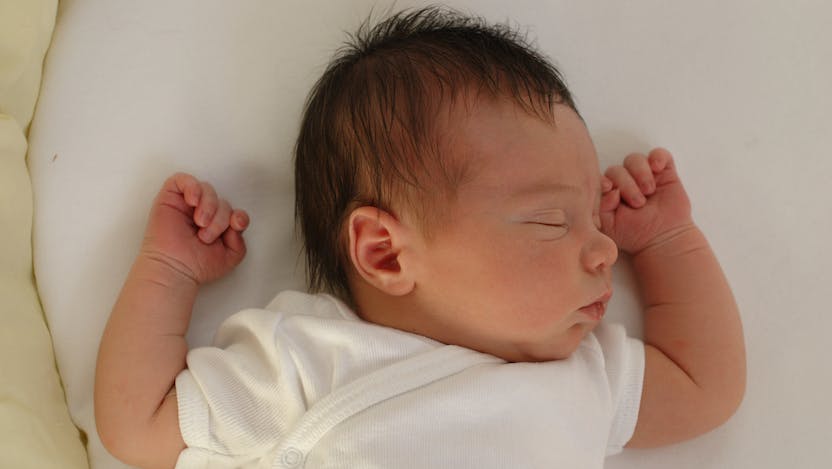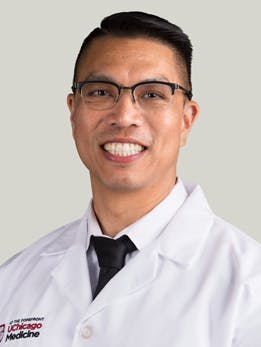UChicago Medicine helps ensure safe sleep for babies

There’s nothing quite like the feeling of snuggling a sleeping baby. But when it comes time for a parent or caregiver to get their own shut-eye, pediatric care experts recommend putting a baby to sleep on their back on a firm, flat surface in a crib or bassinet. The crib or bassinet should not have anything soft or fluffy in it, like stuffed animals, pillows or blankets.
“The crib or bassinet can still be in the same room the parents sleep in,” said Poj Lysouvakon, MD, Pediatric Medical Director of the Well Baby Unit and Pediatric Injury Prevention Program at University of Chicago Medicine Comer Children’s Hospital. “We recommend that parents choose to share a room with their baby rather than sharing a bed.”
However, furniture can be expensive, and new babies already come with lots of added costs and logistics. Some families cannot afford to purchase a crib or haven’t factored it into their planning. Recognizing this need, Comer Children's recently expanded their program to provide free portable cribs to families in the Emergency Department (ED) and throughout the hospital. Similarly, the UChicago Medicine Ingalls Memorial Family Birth Center now provides a free travel cot to every baby born there as part of their Safe Sleep program. The goal: give cribs to families that otherwise would not be able to create a safe sleeping environment for their babies.
“We really want to offer resources to families who are in need,” said Joan Liput, Director of Pediatric Strategy and Operations at UChicago Medicine Comer Children’s Hospital.
Distributing child safety resources
Providing safe sleep spaces for babies can be a matter of life and death. Before a nationwide safe sleep campaign began in the 1990s, there were over 150 infant deaths per 100,000 due to sudden unexpected infant death (SUID). Now, that number has dropped to 20 to 30 deaths per 100,000.
“That’s still too high, and those deaths are disproportionately in lower-income communities,” Lysouvakon said.
To bring that number even lower, healthcare teams at Comer Children's work together to identify families with patients who are less than a year old and may need safe sleep resources. Any member of the baby’s care team — including physicians, social workers and nurses — can send a consultation request based on conversations they have with families. Then dedicated safety program staff can meet with the families to find out what their needs are.
Jasmine Lopez, a child passenger safety technician at Comer Children’s, said that starting in 2023 she and other team members screen for child safety needs not only in the Family Birthing Center, where the program has existed for many years, but also in the ED and the neonatal intensive care unit (NICU).
While infant safety has always been a top concern, Liput said sleep safety rose to even higher priority in the spring of 2023 when medical staff noticed an increase in sleep-related incidents resulting in visits to the ED.
“The medical director of the ED brought the issue to a leadership meeting as an opportunity, and we realized we could tap into resources to meet the needs of families,” she said.
The portable cribs at Comer Children's are provided in partnership with the Cribs for Kids program, a national nonprofit organization focused exclusively on facilitating safe sleep through education and free items including the portable cribs. Cots at UChicago Medicine Ingalls Memorial are sponsored by the Healthy Baby Network, a program managed by UChicago Medicine Ingalls Memorial.
Providing portable cribs is just one of many child safety initiatives at UChicago Medicine. Like cribs, rear-facing car seats with all the necessary features can be prohibitively expensive for some families, but they are also a must for bringing a baby home from the hospital. Lopez and her team provide car seats to families in need through the same screening and distribution process as the portable cribs.
They also expanded that effort in 2023 to add booster seats and convertible car seats for families of ED patients who arrive without a car seat. “At least twice a month, families arrive in the ED in the middle of the night without a safe way to transport their infant home,” Lopez said. Now, they are able to get the equipment and education they need.
The medical center is also part of Family Connects Chicago, a program in partnership with the Chicago Department of Public Health (CDPH) that connects parents with registered nurses who offer free home visits shortly after birth to provide health checks and guidance on everything ranging from feeding to safety.
Partnering with families to keep kids safe
“Whenever we provide resources like portable cribs or car seats, they always come with education before the families leave the hospital,” Lopez said. “We personally visit each family being discharged from the Family Birthing Center to address any questions or concerns they might have. Some people ask for a whole briefing; others have just a few specific questions about small details like installation. We never assume they don’t know what they’re doing.”
Families also receive pamphlets on safe sleep practices as part of the resource package they receive upon discharge, which Lopez said many families have said to be helpful.
Lysouvakon noted that education efforts must take into account that co-sleeping is much more common in other countries and cultures.
“It’s important that we approach families with empathy and cultural sensitivity,” he said. “Instead of telling people what to do right off the bat, we ask them what their plans are regarding things like chestfeeding and co-sleeping. We do let them know what we advise, but we also make an effort to meet everyone at cultural touchpoints.”
According to the American Academy of Pediatrics, “[Chestfeeding] reduces the risk of sleep-related infant deaths, and while any human milk feeding is more protective than none, 2 months of feeding at least partial human milk feeding has been demonstrated to significantly lower the risk of sleep-related deaths.”
Liput said UChicago Medicine hopes to see a decrease in sleep-related incidents over time in the surrounding zip codes as a result of these initiatives and other important work in the community.
"We're committed to promoting health and safety far beyond the walls of our clinics, so we're excited to be sending travel cots out into our community as a resource with lasting impact," said Shanice Williams, MPH, CLC, a community outreach coordinator at UChicago Medicine Ingalls Memorial. "Safe sleep is a foundational necessity for every infant's development."

Poj Lysouvakon, MD
Poj Lysouvakon, MD, is a pediatrician, director of the University of Chicago Pediatric Injury Prevention Program, and pediatric director of the Well Baby Unit at Comer Children's Hospital.
Learn more about Dr. Lysouvakon
